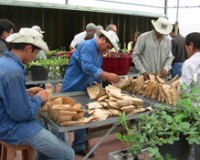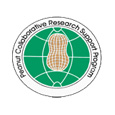
Regions:
Asia, Europe and Eurasia, Global, Latin America and the Caribbean, Sub-Saharan Africa, US and Canada
Related Key Topics:
Capacity Building, Climate Change, Food Security, Gender, Health and Nutrition, Innovation, Markets, Natural Resource Management, Policy, Productivity
Contact
Dr. Scott Brown,
Former Program Director
bugbrown@uga.edu
The Peanut Collaborative Research Support Program (PCRSP) worked to enhance research capability in developing countries and the United States to alleviate constraints limiting sustainable peanut production and food delivery and to increase farmers’ incomes by strengthening the peanut value chain. The PCRSP had a special focus on investigating and reducing the consequences of aflatoxin contamination which can occur in many foods in developing countries, including peanuts and maize (corn), and is associated with suppressed immunity, decreased nutritional status, and elevated HIV incidence.
During its most recent phase the Peanut CRSP had several major research thrusts: food safety, production, socio-economics, utilization, as well as a knowledge management component. Research activities under these broad categories include developing technologies to reduce pre-and post-harvest contamination of peanuts, breeding for disease-resistant varieties, integrated pest management techniques, and studies on market linkages and the policy environment.
USAID’s Bureau for Food Security commissioned an external review of the PCRSP in 2011. The evaluation report was released in 2012 and recommended continued support for another five year phase following the completion of its current award.
The focus of the Peanut CRSP’s research has changed over time. In its early years, it helped to build capacity to improve production and processing technologies, including managing aflatoxin contamination, and worked primarily in Africa and Southeast Asia. Between 1996 and 2007, the CRSP investigated constraints in production, processing, and post-harvest. In its current phase, the CRSP is organized around a value chain approach and has more directly engaged on understanding the relationship between aflatoxin and mycotoxins and human health, seeking solutions such as clay additives to reduce contamination.
The Peanut CRSP has always been based at the University of Georgia. Georgia is the U.S.’s number one producer of peanuts. Peanuts rank as one of the state’s top five cash crops and provide more than 45 percent of peanuts grown annually in the U.S. Research on peanut productivity in developing countries has important benefits to the U.S., such as research results on disease resistant varieties and new solutions for dealing with mycotoxin contamination. According to the CRSP, it has been estimated that the U.S. peanut industry benefits by at least 10 dollars for each dollar invested in the Peanut CRSP.
In 2011-2012, the Peanut CRSP worked with twelve U.S. universities, including Auburn University, University of Alabama (Birmingham), University of Connecticut, Cornell University, University of Florida, University of Georgia (which is also the ME), New Mexico State University, North Carolina State University, Purdue University, Texas A&M University, and Texas Tech University. It is also working with the CGIAR centers of the International Institute for Tropical Agriculture (IITA) and the International Crops Research Institute for the Semi-Arid Tropics (ICRISAT).
During its most recent phase, the PCRSP was active in eleven countries in Africa (Burkina Faso, Ghana, Kenya, Mali, Senegal, Uganda) and Latin America and the Caribbean (Bolivia, Brazil, Guyana, Haiti) and in Asia (Thailand) of which 6 (54 percent) are currently among Feed the Future’s priority countries.

